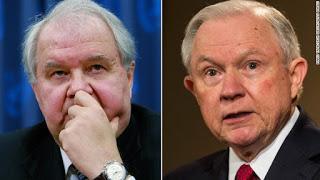
Russian ambassador Sergey Kislyak and Jeff Sessions
As Trump attorney general Jeff Sessions prepares to testify before the Senate Intelligence Committee today about his undisclosed meetings with Russian ambassador Sergey Kislyak, new evidence has surfaced that Sessions and his chief protege engaged in misconduct while serving in the Alabama AG's office.Sessions allegedly solicited companies the AG's office was investigating, according to a 2004 court document. U.S. Circuit Judge Bill Pryor, who followed Sessions as Alabama AG, also engaged in such schemes, according to the document.
The allegations suggest that Sessions and Pryor, using the Republican Attorneys General Association (RAGA) as a conduit, targeted companies for investigation and then solicited the same companies -- apparently strong-arming them to make political contributions in exchange for the investigations being dropped.
Ironically, Alabama GOP operative Jessica Medeiros Garrison, who has worked for both Sessions and Pryor, has served as executive director and senior adviser at RAGA, until quietly backing away from the organization -- or being forced out -- in January 2016. Was Garrison involved in dubious activities at RAGA? The answer to that question remains unclear, but the 2004 court document clearly points to possible wrongdoing involving Sessions and Pryor.
If proven, the activity could amount to a blatantly criminal quid pro quo ("something for something" deal) and put Pryor and Sessions at the center of one of the most egregious abuses of the justice system in modern history. It also would suggest that Pryor's adventures in 1990s gay pornography amount to a relatively mild scandal in his closet.
The court document indicates the charges against Pryor came before the U.S. Senate Judiciary Committee during his confirmation hearings in 2003, but there is no sign that the George W. Bush Justice Department investigated the matter. The document also shows discovery that might have unmasked the scheme was not allowed.
The Pryor/Sessions allegations grew from a case style USX v. Tieco, which started in the mid 1990s and dragged well into the 2000s. Tieco argued that United States Steel (USX of USS) was one of the companies that Pryor/Sessions targeted, then solicited, then granted favorable treatment in court. In short, according to Tieco, USX was allowed to buy "justice" -- via Pryor, Sessions, and RAGA. From the 2004 court document:
In its most current form (Doc. 388, TIECO Supplement To Motion For New Trial), the heart of the newly discovered evidence claim relates to the relationship between the Alabama Attorney General’s office and USS. TIECO says it has now come to light that former Attorney General (now 11 Circuit Judge) Pryor, may have been involved in fund raising involving USS. TIECO says [2003] proceedings before the United States Senate Judiciary Committee contained allegations that former Attorney General Pryor may have been involved, as a member of the Republican Attorneys General Association, in solicitations of companies being investigated by the Attorney General’s office, and that this may also have been the case with companies (like USS) whose causes TIECO alleges were being championed by the Alabama Attorney General’s office. TIECO says a USS PAC made campaign contributions to then Attorney General Sessions and Mr. Pryor for their campaigns (Pryor was Deputy Attorney General under Attorney General Sessions and succeeded him in that office), and afterwards, and that this activity encompassed the period of time involved in the case and the “bad acts” of USS and the Attorney General’s office. TIECO seeks as part of its discovery an Order directing that all the documents relating to these activities be produced, along with documents relating to the Republican Attorneys General Association dealings with USS, and similar documents from the files of Senator Sessions and former Attorneys General Sessions and Pryor.
Was TIECO successful in its efforts to obtain potentially damaging discovery involving Jeff Sessions and Bill Pryor? Not exactly. Virginia Emerson Hopkins was the judge who wrote the 2004 opinion, and we've discovered evidence that she obtained her seat largely through significant contributions she and her husband (Anniston, AL, lawyer Christopher M. Hopkins) made to Sessions, the Bush-Cheney campaign, and U.S. Sen. Richard Shelby. (More on this in an upcoming post.)

Bill Pryor: Robed and disrobed
How did Judge Hopkins handle the matter? For the most part, she punted to the Eleventh Circuit, which would include Bill Pryor in 2005. She also denied TIECO's Rule 60 Motion for a New Trial. From Hopkins' 2004 order:In light of the court’s ruling on the Rule 60 (b) Motion For New Trial, any TIECO discovery requests are moot. In the alternative, for the reasons stated infra, the court does not believe that any discovery TIECO could obtain could change in any meaningful or relevant way the core rulings of the 11 Circuit Court of Appeals in this action or persuade the Court of Appeals to revisit those rulings. Put another way, it is for the Court of Appeals, not this court, to say that the issues regarding the Alabama Attorney General’s office are to be revisited a third time.
Does that smell like a cover-up to you? If so, that's probably because it is one.
It suggests Jeff Sessions is quite experienced when it comes to cover-ups, and he likely is involved in one right now regarding the Trump/Russia scandal.
